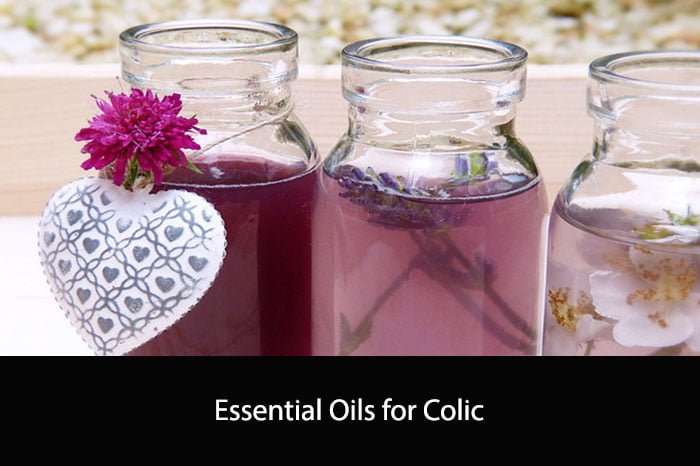Essential oils have been used for centuries to treat a variety of ailments, and colic is no exception. Colic is a common condition that affects many newborns, causing them to cry for hours on end without any apparent reason. While the cause of colic is not fully understood, it is believed to be related to digestive issues. Essential oils may offer relief for colicky babies by helping to soothe their digestive systems.
One essential oil that has been found to be effective for colic is chamomile. Chamomile has anti-inflammatory properties that can help to reduce inflammation in the digestive tract. It also has a calming effect on the body, which can help to soothe a colicky baby. Another essential oil that may be helpful for colic is lavender. Lavender has a relaxing effect on the body and can help to promote sleep, which may be beneficial for colicky babies who have trouble sleeping.

Understanding Colic
Colic is a common condition that affects many infants. It is characterized by excessive crying and fussiness, often occurring in the late afternoon or evening. Although the exact cause of colic is unknown, it is believed to be related to digestive issues and/or an immature nervous system.
Colic can be a frustrating and stressful experience for both parents and infants. It is important to understand that colic is a temporary condition that typically resolves on its own by 3-4 months of age. In the meantime, there are several strategies that can help alleviate symptoms and provide comfort for your baby.
Some common signs of colic include:
- Crying for more than three hours a day, three days a week, for at least three weeks
- Clenching fists, arching back, and pulling up legs
- Difficulty sleeping or staying asleep
- Changes in appetite or feeding patterns
If you suspect that your baby may have colic, it is important to consult with your pediatrician to rule out any underlying medical issues.
In the next section, we will explore how essential oils can be used to help ease colic symptoms.
What Are Essential Oils
Essential oils are highly concentrated plant extracts that are obtained through steam distillation or cold-pressing. They are volatile and aromatic liquids that contain the essence of the plant from which they are derived. Essential oils are used for a variety of purposes, including aromatherapy, massage, and natural health care.
Essential oils are made up of various chemical compounds, including terpenes, esters, aldehydes, ketones, and phenols. Each essential oil has a unique chemical composition that gives it its characteristic aroma and therapeutic properties.
Essential oils are highly potent and should be used with caution. They should always be diluted before use, and some essential oils should be avoided during pregnancy or by people with certain medical conditions. It is important to consult a qualified aromatherapist or health care professional before using essential oils.
The Science Behind Essential Oils and Colic
We understand that colic can be a challenging experience for both parents and babies. While there is no known cure for colic, many parents have found relief in using essential oils. In this section, we will explore the science behind essential oils and colic.
Essential oils are highly concentrated plant extracts that have been used for centuries for their therapeutic properties. Many essential oils have anti-inflammatory, antispasmodic, and calming effects. These properties make them a popular choice for treating colic.
Research has shown that certain essential oils can help alleviate colic symptoms. For example, a study published in the Journal of Alternative and Complementary Medicine found that a blend of essential oils including peppermint, ginger, and fennel was effective in reducing colic symptoms in infants.
Peppermint oil has been shown to have antispasmodic properties, which can help relieve the abdominal pain associated with colic. Fennel oil has been traditionally used to treat digestive issues, and ginger oil has anti-inflammatory properties that can help reduce inflammation in the gut.
It is important to note that essential oils should always be used with caution, especially when it comes to infants. Essential oils should always be diluted before use and should never be ingested. It is also important to consult with a healthcare professional before using essential oils on infants.
In summary, while the science behind essential oils and colic is still evolving, many parents have found relief in using essential oils to alleviate colic symptoms. Essential oils should always be used with caution and under the guidance of a healthcare professional.
Top Essential Oils for Colic
Chamomile
Chamomile essential oil is one of the best essential oils for colic. It has a calming effect on the body and helps to relieve digestive discomfort. Chamomile essential oil is also known for its anti-inflammatory and antispasmodic properties, which can help to reduce colic symptoms.
To use chamomile essential oil for colic, add a few drops to a carrier oil and massage onto the baby’s stomach in a clockwise motion. You can also add a few drops to a diffuser and allow the baby to inhale the scent.
Fennel
Fennel essential oil is another great essential oil for colic. It helps to relieve digestive discomfort and can help to reduce gas and bloating. Fennel essential oil is also known for its antispasmodic properties, which can help to reduce colic symptoms.
To use fennel essential oil for colic, add a few drops to a carrier oil and massage onto the baby’s stomach in a clockwise motion. You can also add a few drops to a diffuser and allow the baby to inhale the scent.
Lavender
Lavender essential oil is known for its calming and soothing properties. It can help to reduce stress and anxiety, which can be a contributing factor to colic. Lavender essential oil can also help to relieve digestive discomfort and reduce inflammation.
To use lavender essential oil for colic, add a few drops to a carrier oil and massage onto the baby’s stomach in a clockwise motion. You can also add a few drops to a diffuser and allow the baby to inhale the scent.
Peppermint
Peppermint essential oil is known for its cooling and soothing properties. It can help to reduce inflammation and relieve digestive discomfort. Peppermint essential oil can also help to reduce gas and bloating, which can be a contributing factor to colic.
To use peppermint essential oil for colic, add a few drops to a carrier oil and massage onto the baby’s stomach in a clockwise motion. You can also add a few drops to a diffuser and allow the baby to inhale the scent. However, it is important to note that peppermint essential oil should not be used on babies under 6 months old.
Ylang Ylang
Ylang ylang essential oil is known for its calming and soothing properties. It can help to reduce stress and anxiety, which can be a contributing factor to colic. Ylang ylang essential oil can also help to relieve digestive discomfort and reduce inflammation.
To use ylang ylang essential oil for colic, add a few drops to a carrier oil and massage onto the baby’s stomach in a clockwise motion. You can also add a few drops to a diffuser and allow the baby to inhale the scent.
Overall, essential oils can be a helpful natural remedy for colic. However, it is important to use them safely and always consult with a healthcare professional before use.

How to Use Essential Oils for Colic
When it comes to using essential oils for colic, there are a few different methods that can be effective. Here are the three main ways to use essential oils for colic:
Topical Application
Topical application is one of the most common ways to use essential oils for colic. To apply essential oils topically, you can mix a few drops of the oil with a carrier oil, such as coconut or almond oil, and massage it onto your baby’s abdomen. Be sure to dilute the essential oil properly, as undiluted oils can be too strong for babies.
Some essential oils that are commonly used topically for colic include:
- Chamomile
- Lavender
- Peppermint
Diffusion
Diffusing essential oils can also be an effective way to soothe colic symptoms. To diffuse essential oils, you’ll need a diffuser that’s designed for use with essential oils. Simply add a few drops of the oil to the diffuser and turn it on.
Some essential oils that are commonly used for diffusing during colic include:
- Fennel
- Ginger
- Lemon
Ingestion
Ingesting essential oils is not recommended for babies, as it can be harmful. However, nursing mothers can ingest certain essential oils to help soothe their baby’s colic symptoms. Be sure to consult with a healthcare professional before ingesting essential oils, as some oils can be harmful or interact with medications.
Some essential oils that are commonly ingested for colic include:
- Fennel
- Ginger
- Peppermint
Overall, using essential oils for colic can be a safe and effective way to soothe your baby’s symptoms. However, it’s important to use them properly and consult with a healthcare professional if you have any concerns.
Safety Precautions When Using Essential Oils
When using essential oils for colic, it is important to take some safety precautions to avoid any potential harm or adverse reactions. Here are some guidelines that we recommend following:
Dilute Essential Oils Properly
Essential oils are highly concentrated and should always be diluted before using them on babies or young children. We recommend using a carrier oil, such as coconut oil or almond oil, to dilute the essential oil. The standard dilution ratio for babies is 0.5% to 1%, which means adding 1 drop of essential oil to 1 tablespoon of carrier oil. For young children, the dilution ratio can be increased to 1% to 2%.
Use High-Quality Essential Oils
It is important to use high-quality essential oils that are pure and free from contaminants. Look for essential oils that are labeled as “therapeutic grade” or “certified organic”. Avoid using essential oils that are adulterated or contain synthetic fragrances, as they may cause adverse reactions.
Avoid Certain Essential Oils
Some essential oils are not recommended for use on babies or young children, as they may cause irritation or other adverse reactions. These include:
- Peppermint
- Eucalyptus
- Rosemary
- Wintergreen
- Camphor
Keep Essential Oils Out of Reach
Always keep essential oils out of reach of children, as they can be toxic if ingested. Store them in a cool, dry place away from direct sunlight.
Perform a Patch Test
Before using any essential oil on your baby or young child, perform a patch test to check for any allergic reactions. Apply a small amount of diluted essential oil to the inside of your child’s wrist and wait for 24 hours. If there is no reaction, it is safe to use the essential oil.
By following these safety precautions, you can safely use essential oils to help relieve colic in your baby. However, if you notice any adverse reactions or your baby’s symptoms worsen, stop using the essential oil and consult a healthcare professional.
Conclusion
In conclusion, essential oils can be a helpful tool for parents looking to alleviate colic symptoms in their infants. While there is limited scientific evidence to support their use, many parents have reported success in using certain oils to soothe their babies.
It is important to note that essential oils should always be used with caution and under the guidance of a healthcare professional. Some oils may be harmful if ingested or applied directly to the skin, and may interact with certain medications.
When using essential oils for colic, it is important to dilute them properly and use them in a safe and appropriate manner. Some oils that may be beneficial for colic include chamomile, lavender, and fennel. These oils can be diffused, added to a carrier oil for massage, or added to a warm bath.
Overall, while essential oils may not be a cure for colic, they can provide a natural and gentle way to help soothe your baby’s symptoms. As always, it is important to consult with your healthcare provider before using any alternative therapies.

Frequently Asked Questions
Are essential oils safe for babies with colic?
As with any treatment, it’s important to consult with your pediatrician before using essential oils on your baby. While some essential oils can be beneficial for soothing colic symptoms, others can be harmful if used incorrectly. It’s also important to note that essential oils should never be ingested by babies.
What are some essential oils that can help soothe a fussy baby?
Some essential oils that are commonly used to soothe babies with colic include lavender, chamomile, and peppermint. These oils can be diluted with a carrier oil, such as coconut or almond oil, and applied to the baby’s skin or diffused in the air.
How can essential oils be used to relieve colic in newborns?
Essential oils can be used in a variety of ways to relieve colic symptoms in newborns. They can be diffused in the air, added to a warm bath, or applied topically to the baby’s skin. It’s important to dilute the oils properly and use them in moderation.
Are there any risks associated with diffusing essential oils around babies?
Diffusing essential oils around babies can be safe if done correctly. It’s important to use a high-quality diffuser and to dilute the oils properly. It’s also important to monitor the baby for any adverse reactions.
Can eucalyptus oil and tea tree oil be safely used around babies?
Eucalyptus oil and tea tree oil are not recommended for use around babies under 6 months old. These oils can be harmful if ingested or applied directly to the skin.
What are some natural remedies for colic in babies?
In addition to essential oils, there are several natural remedies that can help soothe colic symptoms in babies. These include gentle massage, warm baths, and swaddling. It’s also important to ensure that the baby is getting enough sleep and is not overstimulated.





